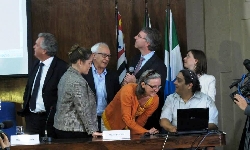Website on Abuses by Brazilian Military Dictatorship Launched in Sao Paulo

Contact: +41 79 507 6363, www.oikoumene.org/press
SAO PAULO, Brazil, August 12, 2013 /Standard Newswire/ -- A new website documenting human rights violations perpetrated by former military dictatorship in Brazil was launched last week in Sao Paulo.
Photo: Sonia Wright, daughter of Rev. Jaime Wright was invited by the coordinators of the project to launch the website of "Brasil: Nunca Mais Digital".
The site, Brasil: Nunca Mais Digital [Brazil: Never Again-digital], provides free access to more than 900,000 pages of official records of human rights abuses and is a follow up to similarly named Brasil: Nunca Mais (BNM) project, which was supported by the World Council of Churches (WCC) in the 1980s.
The files of documents and microfilms, dating to the days of Brazil's military dictatorship in the 1970s and 1980s, have until 2011 been stored in the archives of the WCC in Geneva, Switzerland and the Center of Research Libraries (CRL) in Chicago, USA.
The files were secretly gathered from court records at the time and shipped to the WCC and the CRL for safe keeping.
In June 2011, the WCC general secretary, Rev. Dr. Olav Fykse Tveit, personally brought the files from the WCC Archives to Brazil and entrusted them to the Brazilian attorney general during a public ceremony.
The restored court records are now available for public consultation on the website Brasil: Nunca Mais Digital. The name pays tribute to the 1985 book detailing state crimes committed in the era of military rule.
The website was officially launched with a click by Sonia Wright, daughter of Rev. Jaime Wright, a Presbyterian minister in Brazil, who preserved the military government's records on torture.
The launch of the website marks a new period in Brazil's search for reconciliation after these tumultuous times. During her speech to the estimated 200 participants attending the 9 August event in Sao Paulo, Rosa Maria Cardoso da Cunha, coordinator of Brazil's truth commission, formed in June 2012, referred to BNM as a foundation to country's first truth commission. "What you did in the BNM established a parameter to our work," she said.
One of the key persons behind the website project was regional prosecutor and Brazilian human right activist Dr. Marlon Weichert. He worked closely with the WCC and the CRL arranging repatriation of records, which include evidence that had gone missing from files held by the Supreme Military Court of Brazil, and coordinating the teams that digitalized the documents and set the website.
In an emotional testimony about the process of Brasil: Nunca Mais Digital, Weichert expressed his thankfulness to the WCC former general secretary Rev. Dr. Philip Potter and former WCC staff member, Rev. Charles Harper for their support in originally gathering the evidence.
"The support of the World Council of Churches was crucial to this whole process," said Weichert. "We celebrate the creation of the website, but we also honour the victims and survivors and we reflect about the power of information and the truth."
Brasil: Nunca Mais
The 37th edition of the book Brasil: Nunca Mais is an important record of a time marked by the imprisonment of more than 50,000 Brazilian during the military rule.
Marcelo Zelic, director of the organization called Amazém Memória, who worked closely with the regional attorney, emphasised the work of Charles Harper, who received the files in Geneva and catalogue them in the WCC archives. "Thanks to his careful work we now have the possibility to offer this information to serve as a more effective tool to over 170 criminal investigations that are already been undertaken.
The original Brasil: Nunca Mais project had the direct support of the WCC and the Archdiocese of São Paulo. Both were represented in the event.
While addressing the public, Cardinal Dom Odilo Scherer, Archbishop of São Paulo, wondered what his predecessor Dom Paulo Evaristo Arns and Rev. Jaime Wright would have to say on this occasion. "I am sure they'd have a strong way to tell us: never more!"
Rev. Dr. Walter Altmann, moderator of the WCC Central Committee, spoke about a few episodes that link the WCC and the ecumenical movement to the struggle for human rights in Brazil, Latin American and worldwide.
Thanking the donors of the WCC from the past and the present who make such actions operationally possible, Altmann exhorted international solidarity as a central aspect of the ecumenical movement. "By building bridges for justice and peace across the world we say there is no oppressive regime that can suffocate hope and solidarity forever," said Altmann.
Website: Brasil: Nunca Mais Digital
Healing memories: atrocity documents given by WCC to Brazilian government (WCC news release of 15 June 2011)
High resolution photos can be requested via photos.oikoumene.org
The World Council of Churches promotes Christian unity in faith, witness and service for a just and peaceful world. An ecumenical fellowship of churches founded in 1948, by the end of 2012 the WCC had 345 member churches representing more than 500 million Christians from Protestant, Orthodox, Anglican and other traditions in over 110 countries. The WCC works cooperatively with the Roman Catholic Church. The WCC general secretary is the Rev. Dr. Olav Fykse Tveit, from the [Lutheran] Church of Norway.




 Sign Up to Receive Press Releases:
Sign Up to Receive Press Releases: